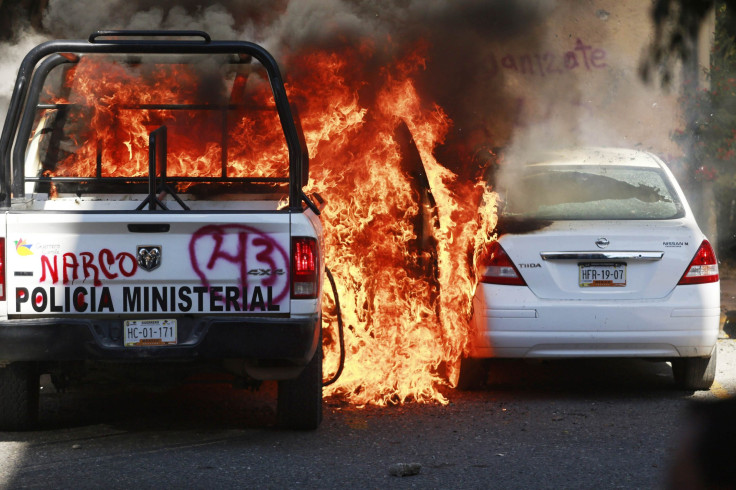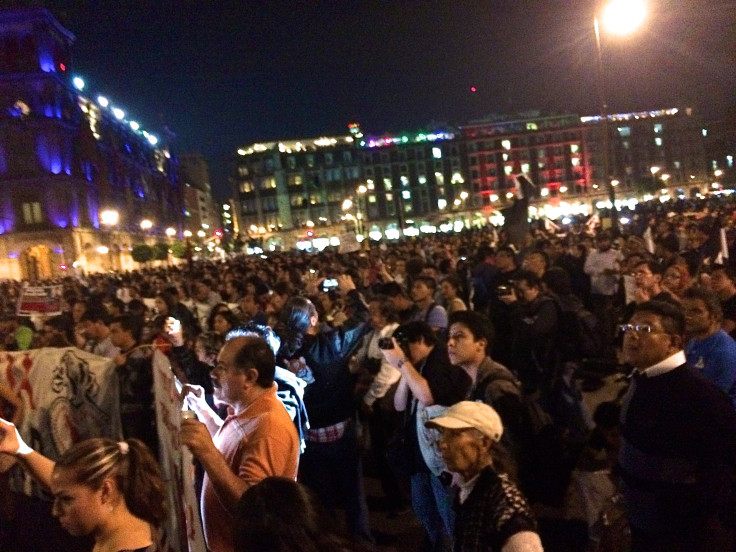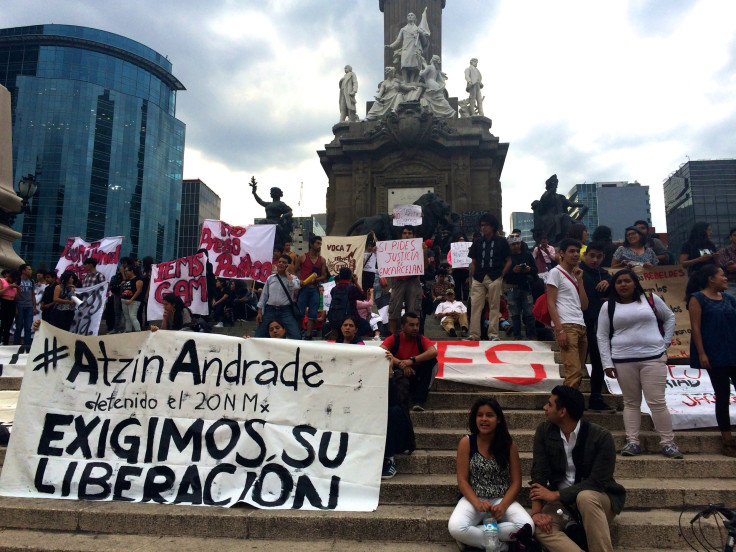Mexicans Mark Peña Nieto's Second Year Of Presidency With Mass Demonstrations

MEXICO CITY -- Mexican protesters are marking the second year of President Enrique Peña Nieto's presidency by denouncing his response to violence and corruption. In the capital, thousands of people were expected to march Monday evening toward the president's official residence, Los Pinos. Activist teachers in other states have canceled classes and are attempting to block the Oaxaca airport and a major Pacific seaport.
The demonstrators' main objective is to urge Peña Nieto to resolve the case of 43 missing students who were protesting a local mayor in Guerrero State when local police and gangs attacked and, presumably, killed them. But Mexicans are also pouring into the streets to vent their broader frustration with Mexico's political system.
"We're asking for the state to protect us -- for local and federal government forces to stop disappearing, killing and detaining the population, and to protect us from cartel violence and criminality," said Jorge Gomez del Campo, an artist and doctoral candidate at the National Autonomous University of Mexico (UNAM), who is planning to join the Mexico City march.
Amid the rising turmoil, some observers are calling Mexico a "failed state."
Last month, Uruguay's President José Mujica said the unrest "gives one a feeling, viewed from a distance, that this is a kind of failed state, that the public powers have totally lost control; they've decayed," according to an interview in Foreign Affairs magazine's Latin America edition. Mexico's Foreign Ministry swiftly rejected the comments, forcing Mujica to backpedal and call for "solidarity" with the Mexican government.
Guillermo Hurtado, a professor at UNAM's Institute of Philosophical Research, said he believes Mexico is in trouble because political leaders have not cracked down on systemic misconduct and violence -- the pervasiveness of which led to the 43 students' disappearance and spurred the killing of around 100,000 people so far amid the country's drug war.
"The Mexican state is a failed state because it does not ensure security for its citizens," Hurtado said. He added while Peña Nieto is not directly to blame for the nation's insecurity problems, "he is responsible for the country. It's he who has to demand a radical transformation of the Mexican state."
Peña Nieto's approval rating has plummeted in recent months, according to a survey by Grupo Reforma, a Mexican media company. Only 39 percent of citizens approve of the president -- an 11 percent drop since August and the lowest level a president has received since 1995. Disapproval of Peña Nieto rose to 58 percent, up from 46 percent during the summer and 30 percent near the beginning of his presidency.

The definition of what constitutes a "failed state" differs in academic circles, and there is no clear set of criteria. Robert Rotberg, an American expert in foreign affairs, has said nations fail because they are "convulsed by internal violence" and governments can no longer deliver "political goods" such as safety, predictable justice systems, freedom of speech, solid infrastructure and health care services, according to his 2003 book, "State Failure and State Weakness in a Time of Terror."
Failed states, Rotberg said, perform abysmally in at least four indicators: gross domestic product per capita; the U.N. Human Development Index, which compiles life expectancy, education and income statistics; Transparency International's Corruption Perception Index, which ranks countries based on perceived levels of government mismanagement; and Freedom House's Freedom of the World Report, an annual survey of political rights and civil liberties.
By Rotberg's standard, Mexico appears "weak" but is not a total failure, an analysis of Mexico's performance in each index indicates. The U.N. gave Mexico a "high human development score" in its latest report, ranking Mexico 71st of 187 countries. (The United States, by comparison, was ranked fifth.) Mexico's GDP per capita -- $10,300 -- is the 85th highest on a list of 226 countries.
Mexico did poorly in the corruption and civil liberties surveys, however. In the 2013 Corruption Perceptions Index, it received a score of 34, with zero meaning a "highly corrupt" country and 100 meaning "very clean." Freedom House gave Mexico a "partly free" status, which signifies the country has an "environment of corruption, weak rule of law … and a political landscape in which a single party enjoys dominance despite a certain degree of pluralism." Mexico's Institutional Revolutionary Party, or PRI, ruled the country from 1929 to 2000 and regained power in 2012 with Peña Nieto's election.
J.J. Messner, a senior associate at the Fund for Peace, a Washington think tank, said he doesn't believe Mexico is a failure. He noted certain parts of the country have been spared the drug-related violence and institutional weakness that is raging in other states. "To say that the entire country as a whole has failed is simply not accurate," he said by phone.
Messner co-directs the annual Fragile States Index, which scores countries based on a dozen risk indicators, including uneven economic development, human rights abuses, mounting demographic pressures and weak state security. He said the organization is moving away from the term "failed state" because it implies a government that has collapsed permanently. "The fragility of a state is very much a continuum over time, and it can improve, and it can worsen," Messner said.
Mexico, for instance, has improved on the fragility index every year since 2010, he noted, with gains in economic development and slowing rates of "brain drain" -- the emigration of highly trained and educated people to more prosperous economies. Even so, Mexico still earned a "high fragility warning" in this year's index, with a score of 71.1. (South Sudan, by comparison, scored the highest, with 112.9 points.)
"The most worrying indicator of all for Mexico still remains security," Messner said. "There's also been a worsening of human rights and rule of law in the last several years."
Human rights groups in recent weeks have criticized Peña Nieto's administration after federal police attacked and detained demonstrators during a Nov. 20 demonstration in Mexico City. Advocacy groups, including México Evalúa and the Network for Children's Rights in Mexico, have called on the government to protect people's right to protest Monday and avoid using excessive force and making arbitrary arrests, local media reported.
At the Nov. 20 march, police arrested 11 people on trumped-up charges of mutiny, organized crime and intended homicide. Several days later, family and supporters marched in Mexico City to demand the prisoners' release.

Jose Luis Bautista, the boyfriend of one of three female prisoners, Eliana Garduña Ortega, said the woman had been protesting peacefully when police beat and detained her. Garduña Ortega, a 30-year-old mother of two, is pursuing her high school degree. "She's just a person who wants to do better for her kids," Bautista said while holding a white rose and marching down Reforma Avenue.
Last weekend, the 11 detainees were released from federal prison after a judge found Mexico's attorney general didn't have sufficient evidence to support the charges.
In an incident last Friday, a student activist was detained by plainclothes police officers near his campus in the capital's university district. Sandino Bucio was a leader of 2012's #YoSoy132 movement that aimed to keep Peña Nieto from taking office. In a shaky cell phone video, police can be seen shoving Bucio into the backseat of a silver sedan. The student was freed after six hours and said he believes the incident was meant to intimidate the public and keep people from protesting the government, local media reported.
Jorge Gomez del Campo, the artist and UNAM student, said such detentions are having a chilling effect on public protests. He said his group of anarchist activist friends isn't planning to attend Monday's march in the capital. "They're all scared" of being attacked by police or falsely accused, he said.
© Copyright IBTimes 2024. All rights reserved.





















